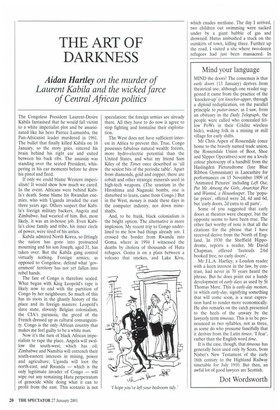Mind your language
MIND the doors! The consensus is that early doors (13 January) derives from theatrical use, although one reader suggested it came from the practice of the `knocker-up' (or knocker-upper, through a diploid reduplication, on the parallel principle to putter-inner, as I saw, from an obituary in the Daily Telegraph, the people were called who concealed fellow PoWs in their Colditz wireless hide), waking folk in a mining or mill village for early shifts.
Mr Chris Aspen of Rossendale (once home to the bravely named trade union, the Rossendale Union of Boot, Shoe and Slipper Operatives) sent me a lovely colour photocopy of a handbill from the Haslingden Picturedrome (late Blue Ribbon Gymnasium) in Lancashire for performances on 15 November 1909 of 'Animated Pictures' including Left Out, Put Me Among the Girls, Anarchist Plot and Wanted, a Housekeeper. The 'popular prices', offered were 2d, 4d and 6d, but 'early doors, 2d extra to all parts'.
Some of you suggested that early doors at theatres were cheaper, but the opposite seems to have been true. The other fact worthy of note is that all the citations for the phrase that I have received derive from the North of England. In 1930 the Sheffield Hippodrome, reports a reader, Mr David Chapman, offered 'fauteuils 2/6d booked free, no early doors'.
Mr J.L.A. Hartley, a London reader with a keen interest in the law, by contrast, had never in 70 years heard the phrase. But he does point out a handy development of early days as used by St Thomas More. This is early-day motion, in which early-day, signifying something that will come soon, is a neat expression hard to render more economically. He also remarks on the catch presented to the heels of the unwary by the lawyerly term tirneous. This is to be pronounced as two syllables, not as three, as some do who presume fancifully that it derives from the Latin timeo, 'I fear', rather than the English word time.
It is the case, though, that timeous has generally been used only by Scots, from Nisbet's New Testament of the early 16th century to the Highland Railway timetable for July 1910. But then, an awful lot of good lawyers are Scottish.
Dot Wordsworth






















































































 Previous page
Previous page